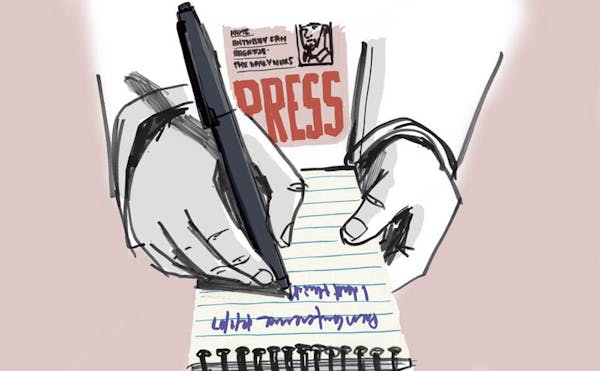No single campaign issue has generated as much passion and intensity in Minnesota as the ill-conceived marriage amendment.
On Nov. 6 voters will be asked to add a ban on marriage between gays and lesbians to the state Constitution. At its core, the debate is about fairness and freedom -- and about what does or does not belong in our Constitution.
With those key principles in mind, Minnesota should be the first state in the nation to decline such a proposal. Denying something as basic as marriage to two committed adults has no place in a state's most important legal document.
Words have mattered mightily in this discussion. Should we "limit" the opportunity to wed? Would matrimony be somehow "redefined" if gays are eligible? Most important, what does "marriage" mean?
Supporters of the constitutional change believe that marriage should apply only to one man and one woman; therefore, same-sex unions redefine what marriage means. They argue that same-sex couples somehow threaten or diminish heterosexual couples and families.
Amendment supporters also believe that the primary purpose of marriage is to make babies and that government has an interest in protecting children. Men and women are not interchangeable, they argue, and state rules should uphold the ideal that kids should be cared for by a mom and a dad.
Those concerns are easily refuted. Marriage is the voluntary union of two loving, consenting adults who want to make a legal commitment. Religions can and do limit matrimony to heterosexuals, and it is their right to refuse marriage to whomever they please. But it is not government's role to deny rights based on religion.
As to the "defense" of traditional marriage: There is no legitimate proof that same-sex marriages have any impact whatsoever on other families or relationships.
Yes, some marriages produce children, but many do not. It's certainly not the sole reason for marriage in modern society. Yet studies have shown that marriage is indeed good for children -- the commitment tends to result in more stability and responsibility from the adults involved -- whether the parents are gay or straight.
Same-sex-marriage bans fly in the face of societal, legal and generational trends. Seven U.S. states and many developed nations now allow gay marriage. And polls during the past decade show increasing acceptance of gay and lesbian unions. Last week, a Manhattan appeals court struck down a key part of the federal Defense of Marriage Act by ruling that it is unconstitutional to deny federal benefits to legally married gay couples.
Approving a constitutional ban on gay marriage would have a negative impact on Minnesota's economic climate. That's why dozens of state businesses are among the nearly 700 partners in the Minnesotans United for All Families Coalition -- the statewide campaign to defeat the amendment. Many of those firms wisely offer domestic-partner benefits, understanding that gay employees cannot marry under existing state law. And none of them want to alienate customers or talented potential employees by sending a signal that Minnesota is taking a step back on gay and lesbian acceptance.
For many Americans under 35, gay marriage is a nonissue, and in the not-too-distant future, younger generations are likely to reject unjust antigay laws anyway.
The notion that gay marriage begins a slippery slope toward undoing reasonable marriage limitations is ridiculous. Government prohibits marriage between children and siblings, for example, for good and obvious reasons -- none of which apply to consenting adults. Until 1968, marriage between different races was illegal in several states. Those provisions fell because they were wrong -- and so are gay-marriage bans.
Keeping this form of discrimination out of the Constitution would not legalize the recognition of same-sex marriage in this state -- such recognition is denied under existing law. But defeating the amendment would demonstrate the will of the people and would become an important first step toward recognition.
We'd urge voters to think about the gay or lesbian friend and coworker in the next cubicle, the nice same-sex couple down the street, or the beloved gay family member. They have the same hopes and dreams as heterosexuals, and for many that includes the desire to marry and form a family with the person they love.
In our hearts and souls, we Minnesotans are basically fair people who believe in human rights. That fundamental sense of humanity should lead to a "no" vote on the marriage amendment.
------------------------
To read more marriage amendment commentaries, go here.
Protect kids online

Here's how I'd broadly frame the environment that led to my firing as a teacher
Get rid of Minnesota's precinct caucuses, go to primary elections up and down the ballot


